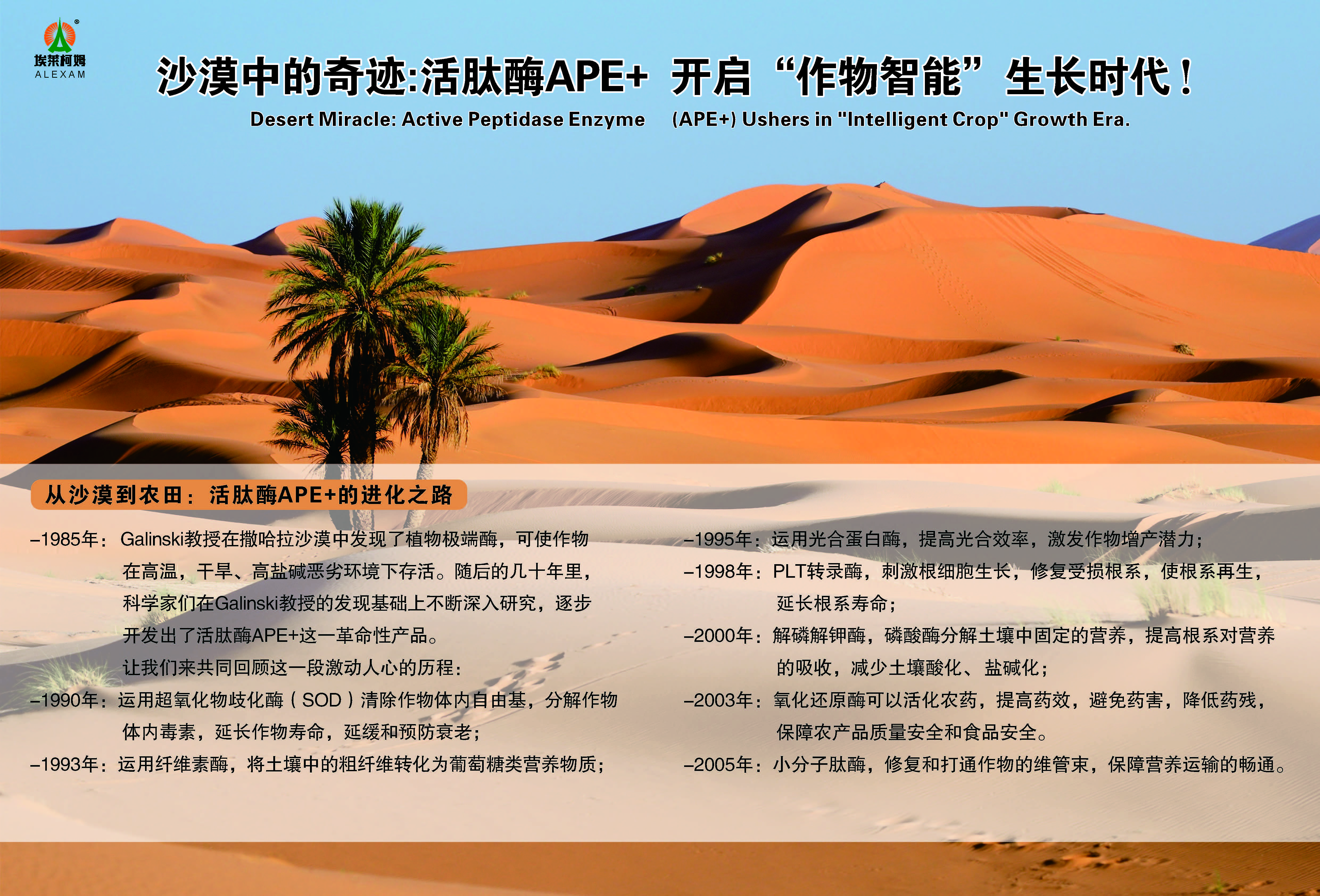Miracle in the desert: Active peptidase APE+opens up the era of
From Desert to Farmland: The Evolutionary Path of Active Peptide Enzyme APE+ In 1985, Professor Galinski discovered the extreme enzymes produced by halophilic bacteria in plants in this extreme environment. This enzyme can significantly enhance the stress resistance of plants, allowing them to survive in harsh environments such as high temperature, dryness, and high salinity. In the following decades, scientists continued to delve deeper into Professor Galinski's discoveries and gradually developed the revolutionary product of active peptidase APE+. Let's review this exciting journey:

The dilemma of Chinese agriculture
However, just as scientists are celebrating these breakthroughs, China's farmland is facing severe challenges.
China's arable land area accounts for 7% of the world's total, but it consumes 33% of the world's total fertilizer production. In the past 60 years, our grain production has increased by about 4 times, but the amount of fertilizer applied has increased by 100 times.
With the continuous increase in the use of chemical fertilizers and pesticides, the phenomenon of excessive use of fertilizers and pesticides has become increasingly serious, leading to soil acidification, salinization, and the problem of soil borne diseases in repeated cropping, resulting in root rot, yellowing, and premature aging of crops. However, ordinary farmers may think that this is a deficiency in nutrients and continue to use fertilizers and pesticides to solve it, but the result is contrary to their wishes. The "secondary salt damage" to the soil and crops becomes more severe, resulting in the phenomenon of "fed thin soil", "salt jars, vinegar jars, and manure pits". The metabolic capacity of crops becomes weaker, and even many "cancers" of crops appear, such as; Banana Panama disease, citrus huanglongbing, cotton wilt disease, pear branch disease, etc.
Active peptidase APE+: an antidote to agricultural difficulties
Active peptidase APE+is a promising remedy for addressing key issues faced by crops and soil in agriculture.
1. Improve the efficiency of photosynthesis
The photosynthetic protease in APE+can accelerate the process of photosynthesis, promote the production of more photosynthetic products (i.e. carbohydrates) in chloroplasts, and guide their transport to the reproductive organs of crops, such as buds, flowers, and fruits, achieving early flowering, early fruiting, early color transformation, and early maturity, and stimulating the maximum yield increase of crops. It's like installing a 'super engine' on plants, allowing them to utilize sunlight more efficiently.
2. Open up channels for water and nutrient transport
The function of small molecule peptidases is to clear and dissolve blood clots in patients with heart or cerebral infarction. As is well known, the transpiration of crops relies on the absorption of water and nutrients from the soil by the roots, which are then transported to the "roots, stems, and leaves" of the crops through the vascular bundles of the stems. The abuse of chemical fertilizers leads to severe fertilizer residues in the soil, with increasingly high EC values. When the salt concentration and osmotic pressure of the soil are higher than those of crop roots, the soil will "suck back" water and nutrients from the crops through the roots, resulting in stunted crop growth, delayed development, and the occurrence of "dead plants, rotten seedlings, and rotten roots". Small molecule peptidases can directly open up the vascular bundles in the root tips and stems of crops, making the vascular channels unobstructed, enhancing transpiration, and improving the ability of roots to absorb water and nutrients, thereby ensuring the healthy growth of crops.
3. Improve resilience
Extreme enzymes are specific functional enzymes that enhance crop stress resistance. In most crops grown outdoors, it is difficult to change the impact of adverse weather and soil environment on their growth. Therefore, improving the crop's own stress resistance is particularly crucial. The extreme enzyme in APE+can enhance crop stress resistance and significantly improve survival rates in extreme environments such as high temperature, drought, and high salinity. The role of extreme enzymes is like that of the COVID-19 in 2019. It is difficult to eliminate the source of the virus and the transmission route. We can only rely on "vaccination" to improve the human body's immunity, reduce the mortality rate and reduce the pathogenicity.
4. Reduce pesticide abuse
The application of oxidoreductases is like equipping plants with an "intelligent drug delivery system". With the increasing demand for agricultural products among the general public and the growing emphasis on food safety, the country has also introduced the "Agricultural Product Quality and Safety Law". However, the blind abuse of pesticides is still common, especially in the high temperature and high humidity south where crops are planted multiple seasons a year, and pests and diseases multiply repeatedly. Drug resistance is becoming stronger, and the level of medication is 5-10 times higher than usual. With such intensive frequency and dosage of medication, the prevention and control effect is getting worse and even "ineffective". The use of oxidoreductases can promote pesticide absorption, improve efficacy, reduce drug residues caused by blind overuse, and make crop growth healthier and agricultural products safer to consume.
Founder of Active Peptide Enzyme APE+- Elekom Corporation
So, who developed this revolutionary technology? Let's meet the founder of the active peptidase APE+: Alexam Corporation.
It specializes in the research and application innovation of active peptidase APE+technology. Alexam has over 30 years of scientific research achievements in the global field of biological enzymes, with 16 global invention patents, and is widely used in the fields of medicine, food, animal husbandry, daily chemicals, industry, and agriculture.
relies on the advantages of desert extreme environmental resources and mainly engages in the biological extraction and industrial production of active peptidase APE+core raw materials.The distribution center is located in China. Alexam China , mainly engaged in the production and sales of active peptidase APE+products, serving the development of green agriculture in China and exploring the huge market potential in the development of efficient agriculture in China!
The slogan is: Healthy Life, Enzyme Good Era! Healthy Forever.
The goal of the enterprise is to usher in the era of "crop intelligence" growth and achieve quality control of agricultural products throughout the entire process from farmland to dining table.
The application of biological enzymes is the trend of future agricultural development
Enzymes are biological catalysts, without enzymes there is no life. They dominate the metabolism, nutrition, and energy conversion processes of all living organisms. Early enzyme engineering technology mainly involved extracting, separating, and purifying materials from animals, plants, and microorganisms. In the 1980s, breakthroughs were made in enzyme immobilization technology. Alexam, with over 30 years of scientific research achievements in the field of biological enzymes and 16 global invention patents, has developed the active peptidase APE+(active small molecule peptide complex enzyme), which has laid the earliest and most widely used "milestone" in the field of biological enzymes. The 6.0 era of active peptidase APE+has arrived and will be applied to the pharmaceutical, food, animal husbandry, daily chemical, industrial, and agricultural related fields on a larger scale.
The development of agricultural planting in the next 60 years will largely rely on the potential performance of crops in terms of health, yield increase, quality improvement, and stress resistance, all of which cannot be separated from enzymes.
Active peptidase APE+has the characteristics of high efficiency, specificity, functionality, complexity, and automatic regulation. It has a wide range of compatibility and adaptability, and can be compounded with traditional pesticides and fertilizers. It has low energy consumption, no pollution, and high efficiency in improving drug efficacy and fertilizer efficiency. In the fertilizer formula and usage plan, if biological enzymes are added, it can quickly and effectively promote the intelligent absorption and conversion of nutrients by crops, and intelligently allocate nutrients to the parts where crop growth needs them most, relieve nutrient antagonism, and improve fertilizer utilization efficiency. Active peptidase APE+can also be added as a raw material to pesticide products, opening up vast space in energy conservation, efficiency improvement, pollution reduction, agricultural product safety, and differentiated development.
Embark on the era of intelligent crop growth
From the historic discovery of the Sahara Desert to the revolutionary technology that enabled 'crop intelligence' growth, the story of APE+tells us that the future of agriculture lies not in simply increasing inputs, but in intelligently unleashing the potential of crops themselves.
As Alexam has stated, we are entering an era of 'enzyme excellence'. In this era, we will witness a tremendous transformation in agricultural production methods and see the gradual formation of greener, healthier, and more efficient agricultural ecosystems. Active peptidase APE+is like a "magical key" that unlocks the "gene expression code" from the crop itself. It will play an increasingly important role in stimulating crop growth potential, and the era of "crop intelligence" growth is not far away for humans.
